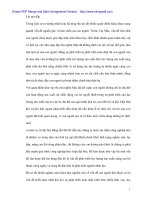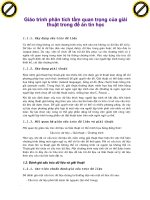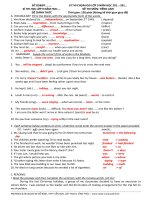TRỌNG TÂM NGỮ PHÁP TIẾNG ANH
Bạn đang xem bản rút gọn của tài liệu. Xem và tải ngay bản đầy đủ của tài liệu tại đây (103.15 KB, 5 trang )
TRỌNG TÂM NGỮ PHÁP TIẾNG ANH
1. Verb tenses :
a. Present Simple, Prsent Continuous, Present Perfect, Present perfect Continuous.
b. Past Simple, Past Continuous, Past Perfect, Past perfect Continuous.
c. Going to future, Future Continuous, will Future, Future Perfect.
2. Passive voice.
3. Modal verbs :
can, could, must, may, shall, should, would, will, ought to .
Modal
Example
Uses
Can
They can control their own budgets.
We can’t fix it.
Can I smoke here?
Can you help me?
Ability / Possibility
Inability / Impossibility
Asking for permission
Request
Could
Could I borrow your dictionary?
Could you say it again more slowly?
We could try to fix it ourselves.
I think we could have another Gulf War.
He gave up his old job so he could work for us.
Asking for permission.
Request
Suggestion
Future possibility
Ability in the past
May
May I have another cup of coffee?
China may become a major economic power.
Asking for permission
Future possibility
Might
We'd better phone tomorrow, they might be eating
their dinner now.
They might give us a 10% discount.
Present possibility
Future possibility
Must
We must say good-bye now.
They mustn’t disrupt the work more than necessary.
Necessity / Obligation
Prohibition
Ought to
We ought to employ a professional writer.
Saying what’s right or
correct
Shall
(More
common in
the UK than
the US)
Shall I help you with your luggage?
Shall we say 2.30 then?
Shall I do that or will you?
Offer
Suggestion
Asking what to do
Should
We should sort out this problem at once.
I think we should check everything again.
Profits should increase next year.
Saying what’s right or
correct
Recommending action
Uncertain prediction
Will
I can’t see any taxis so I’ll walk.
I'll do that for you if you like.
I’ll get back to you first thing on Monday.
Profits will increase next year.
Instant decisions
Offer
Promise
Certain prediction
Would
Would you mind if I brought a colleague with me?
Would you pass the salt please?
Asking for permission
Request
Would you mind waiting a moment?
"Would three o`clock suit you?" - "That’d be fine."
Would you like to play golf this Friday?
"Would you prefer tea or coffee?" - "I’d like tea
please."
4. Verb patterns
1. VERB + -ing
verb + -ing
admit
adore
allow
avoid
can´t stand
carry on
consider
deny
delay
(don´t) mind
enjoy
fancy
finish
give up
imagine
involve
keep
keep on
postpone
practise
put off
recommend
risk
suggest.
eg.
He avoided writing the test.
Keep smiling!
Did you enjoy reading the
book?
He denied stealing the purse.
I don´t mind helping you.
He doesn´t allow smoking in
his house.
He recommended staying in
that
hotel.
2. VERB + to +
infinitive
afford
agree
allow (passive)
appear
arrange
ask
attempt
choose
dare
decide
expect
fail
forget
help
hope
learn
manage
offer
plan
pretend
promise
refuse
seem
tend
threaten
want
would like to
eg.
I can´t afford to go on
holiday.
She´s decided to give up
her job.
It seems to be a nice
day.
He agreed to lend me
some money.
You are not allowed to
Request
Making arrangements
Invitation
Preferences
3. VERB + object + to +inf.
advise
allow
ask
beg
encourage
expect
force
invite
order
permit
persuade
recommend
remind
teach
tell
want
warn
would like
eg.
They invited us to stay in their
house.
She told me to come on time.
They asked us not to make such a
noise.
4. VERB + -ing / to inf.
- no change in meaning
begin
continue
intend
start
eg. It started to rain / raining.
smoke here.
5. VERB + object + inf.
- no TO in this structure
help
let
make
Let me show you.
The news made her
6. VERB + -ing / to + inf.
-change in the meaning
REMEMBER
doing sth.
- when you did something
and now you remember it;
after you did sth.
Eg. I don´t know how the
burglar got in. I clearly
remember locking the door
and shutting the windows.
to do sth
- you remembered that you
had to do sth, so you did
it; before you did it
eg. I remembered to lock the
door but I forgot to shut the
windows.
TRY
doing sth.
- try something to see if it
works or solves the
problem
eg. – I´ve got a terrible
headache.
- Why don´t you try taking an
aspirin?
to do sth.
- attempt to do, make an
effort to do sth.
Eg. I tried to keep my open
but I couldn´t.
STOP
doing sth.
- to give up, finish with sth
completely
eg. I stopped smoking two
years ago. (I don´t do it
anymore)
to do sth.
- stop doing what you are
doing at the moment in
order to do sth else
eg. I was reading a book. The
phone started to ring. I
stopped to answer it.
NEED
doing sth.
- sth. needs to be done
about sth else (the
meaning is passive_
eg. Look at this room. It
needs painting.
to do sth
- it is necessary for me to do
it
eg. He put on weight. He
needs to take more exercise.
I need to do the shopping
today.
REGRET
doing sth.
- I did sth and now I am
sorry about it.
Eg. I now regret saying what
I said.
to do sth.
- regret to say/tell/inform
you = I´m sorry I have to
say…
eg. I regret to tell you that
you have failed the test.
MEAN
doing sth.
- an impersonal subject,
refers to what is involved
eg. If we catch an early train,
it will mean getting up at
6.00.
to do sth
- to intend
eg. Sorry, I meant to tell you
about the party.
GO ON
doing sth.
- to continue doing the same
thing
eg. The minister paused for a
moment and then went on
talking about the education
5. Complex sentenses :
a. Relative clauses
b. Noun clauses
c. Time clauses
d. Conditionals
6. Some other structures:
+ Get / have something done
+ Be / get used to
+ too, very, enough , so, such
+ Have to verb.









